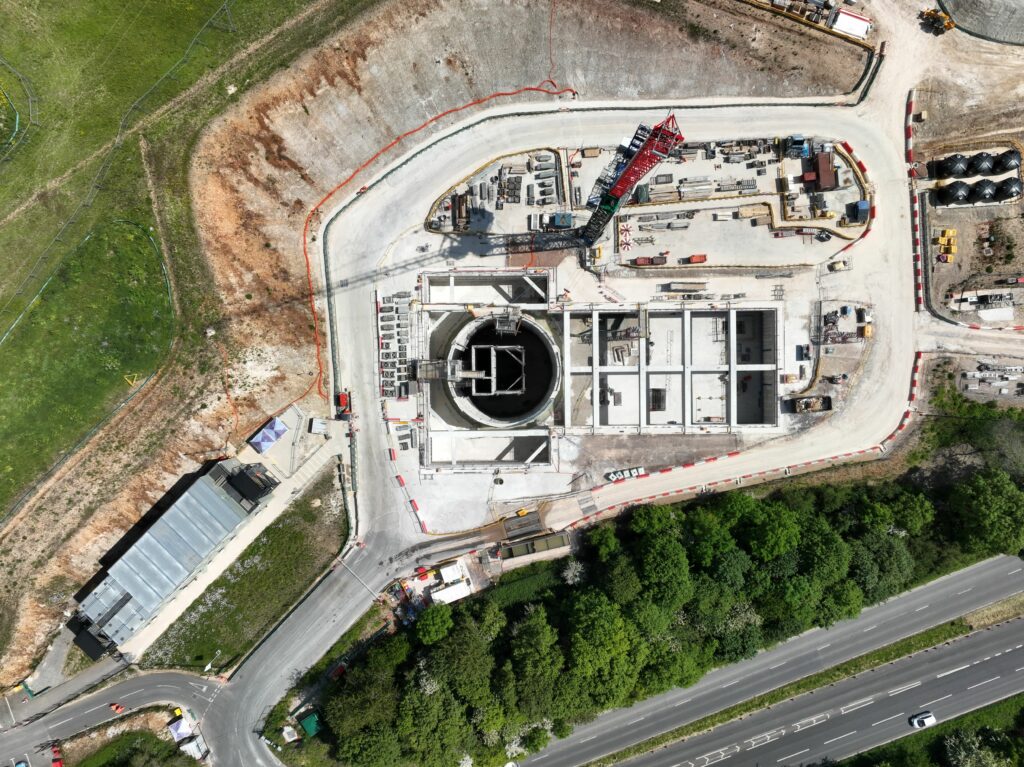HS2 today confirmed that ‘Florence’ and ‘Cecilia’ – the two giant tunnelling machines digging HS2’s longest tunnels – have reached the Little Missenden ventilation shaft, more than three quarters of the way through their 10 mile drive under the Chilterns.
The enormous 2,000 tonne machines have spent two years excavating the twin tunnels between the M25 and South Heath in Buckinghamshire that will help improve connections between London, Birmingham and the North.
Each machine is a 170m long self-contained underground factory, digging the tunnel, lining it with 56,000 concrete segments to form rings and grouting them into place as it moves forward.
Designed specifically for the geology of the Chilterns, the first TBMs were launched in Summer 2021 from a site near the M25 and have already excavated approximately 2 million cubic metres of chalk and flint.
As well as digging and lining the tunnels, engineers have also completed the excavation of five shafts that will provide ventilation and emergency access near Chalfont St Peter, Chalfont St Giles, Amersham and Little Missenden with an intervention shaft at Chesham Road.
The 35m deep shaft near Little Missenden – which the TBMs have now reached – is next to the A413 about half a mile from the Buckinghamshire village.
A ‘headhouse’ will be built on top of the shaft to house ventilation and safety equipment, designed to resemble local farm buildings with new planting to help blend it into the surrounding landscape.
The news comes just weeks after planning consent was granted by Buckinghamshire Council for the North Portal of the tunnel under Schedule 17 of the HS2 Act, meaning that all major design elements now have consent.
David Emms, HS2 Ltd’s Project Client, said:
“HS2 will transform rail journeys between London the midlands and the north, and free up space on the existing network for more freight and local services. We’re seeing great progress on the tunnel, which will take our trains deep under the Chiltern hills, safeguard the woodlands and wildlife habits above and significantly reducing disruption to communities.
“The huge progress that Florence and Cecilia have made would not have possible without a huge team in support – manufacturing the tunnel segments, excavating the vent shafts and I’d like to thank everyone involved.”

The two TBMs are operated by, Align – a joint venture formed of Bouygues Travaux Publics, Sir Robert McAlpine, and VolkerFitzpatrick.
Each machine has a crew of around 15 people, working in shifts and supported by over 100 people on the surface, managing the logistics and maintaining the smooth progress of the tunnelling operation.
Daniel Altier, Align’s Project Director, said:
“Both TBMs reaching our fourth shaft at Little Missenden is a great achievement for not only the tunnelling team and the team involved in excavating and preparing the shaft, but also the supporting teams on the surface at the South Portal, manufacturing the concrete segments required to line the tunnel and processing the spoil from the tunnels.”
“In particular I would like to pay credit to Align Shafts team, working with our supply chain partners and Keltbray, who have been working over the last few months to ensure the shaft is ready for the arrival of Florence and Cecilia.”
Approximately 2.7 million cubic metres of material – mostly chalk and flint – will be excavated during the construction of the tunnels and used for landscaping. Once construction is complete, the temporary buildings at the south portal will be removed and the site landscaped with around 90 hectares of wildlife-rich chalk grassland habitats.
Chalk grassland used to be widespread across the hills of southeast England and are considered habitat of international conservation significance with just 700ha left across the Chilterns.
HS2 currently has five TBMs in the ground, with a further five due to be launched over the coming years. Together they will create 64 miles of tunnel between London and the West Midlands including major tunnels on the approach to London and Birmingham.
Photo credit: HS2 Ltd


